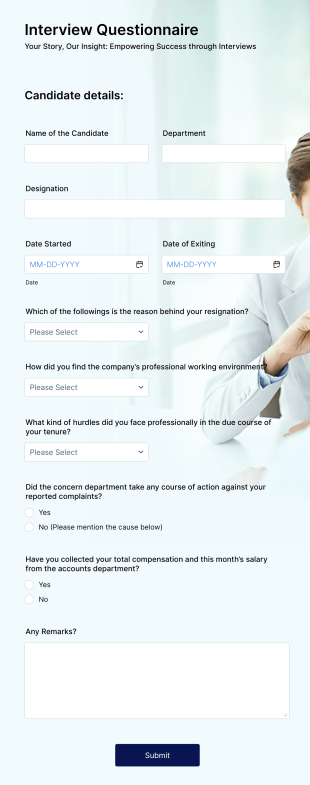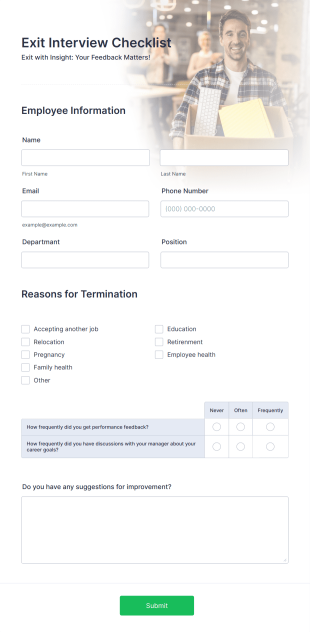Exit Interview Templates
About Exit Interview Templates
Exit Interview Templates are structured forms designed to collect feedback from employees who are leaving an organization. These templates help HR departments and managers understand the reasons behind an employee’s departure, gather insights on workplace culture, identify areas for improvement, and ensure a smooth transition. Exit interviews can cover topics such as job satisfaction, management effectiveness, work environment, and suggestions for organizational growth. By standardizing the exit interview process, organizations can systematically analyze trends and address recurring issues, ultimately improving employee retention and workplace satisfaction.
With Jotform, users can easily access and customize a wide range of Exit Interview Templates to fit their organization’s unique needs. Jotform’s intuitive drag-and-drop Form Builder allows HR professionals to tailor questions, add branding, and integrate with other tools for seamless data collection and analysis. The platform’s no-code approach means anyone can create, modify, and deploy exit interview forms in minutes, ensuring a consistent and efficient process. Automatic data storage, real-time notifications, and advanced filtering features make it easy to manage and review feedback, helping organizations make informed decisions based on actionable insights.
Use Cases of Exit Interview Templates
Exit Interview Templates can be adapted for various scenarios and organizational needs. Here’s how they can be utilized, who might use them, and how their content may differ:
1. Possible Use Cases:
- Standard employee exit interviews for full-time staff
- Exit interviews for interns, contractors, or temporary employees
- Department-specific exit interviews (e.g., sales, IT, customer service)
- Remote or offboarding interviews for employees leaving due to relocation or remote work changes
- Exit interviews focused on specific issues, such as workplace culture or management feedback
2. Problem Solving Points:
- Identifying patterns in employee turnover
- Uncovering workplace issues or management challenges
- Improving onboarding and retention strategies
- Ensuring compliance and proper documentation during offboarding
- Facilitating knowledge transfer and transition planning
3. Possible Owners and Users:
- HR managers and HR departments
- Team leaders and department heads
- Organizational development specialists
- Small business owners
- Third-party HR consultants
4. Differences of Creation Methods:
- Content and fields may vary based on the employee’s role, department, or reason for leaving
- Templates for interns may focus on learning experiences, while those for senior staff may include leadership feedback
- Remote exit interviews might include questions about virtual collaboration tools and remote work policies
- Some forms may require additional confidentiality agreements or legal disclosures
In summary, Exit Interview Templates offer flexibility to address a variety of offboarding scenarios, ensuring organizations gather relevant feedback and maintain a positive employer brand.
How to Create an Exit Interview Template
Creating an effective Exit Interview Template with Jotform ensures you gather valuable feedback while providing a professional and seamless experience for departing employees. Here’s a step-by-step guide to building and managing your exit interview process using Jotform, tailored to your organization’s specific needs and scenarios:
1. Start with the Right Template or From Scratch:
- Log in to your Jotform account and click “Create” on your My Workspace page.
- Choose “Form” and either select a pre-made Exit Interview Template from Jotform’s extensive library or start from scratch.
- Decide on the layout: Classic Form (all questions on one page) for a comprehensive overview, or Card Form (one question per page) for a guided, conversational experience.
2. Customize the Form for Your Use Case:
- Add your organization’s logo and update the form title to reflect the specific exit interview scenario (e.g., “Sales Department Exit Interview” or “Remote Employee Exit Survey”).
- Use the drag-and-drop Form Builder to add or modify fields. Common fields include:
- Employee name and position
- Department and manager
- Reason for leaving (multiple choice or open-ended)
- Job satisfaction ratings
- Feedback on management and workplace culture
- Suggestions for improvement
- Final comments and contact information
- For specialized use cases, include fields relevant to the employee’s role or reason for departure (e.g., questions about remote work tools, project handover, or training experiences).
3. Enhance the Form with Widgets and Integrations:
- Add widgets such as rating scales, long text fields, or e-signature fields for confidentiality agreements.
- Integrate with HR management tools, cloud storage, or email platforms to automate data collection and follow-up.
4. Set Up Notifications and Data Management:
- Configure autoresponder emails to confirm receipt of the exit interview to the departing employee.
- Set up notification emails for HR or relevant managers to review submissions promptly.
- Use Jotform Tables to organize, filter, and analyze responses for actionable insights.
5. Publish and Share the Form:
- Click “Publish” and share the form link via email, internal HR portals, or direct message.
- For remote or offsite employees, ensure the form is mobile-friendly and accessible from any device.
6. Test and Refine:
- Preview the form and submit a test entry to ensure all fields function correctly and notifications are received.
- Adjust questions or settings based on feedback from HR or recent exit interview participants.
By following these steps, you can create a tailored Exit Interview Template that streamlines the offboarding process, captures meaningful feedback, and supports continuous organizational improvement.
Frequently Asked Questions
1. What is an exit interview template?
An exit interview template is a standardized form used to collect feedback from employees who are leaving an organization, helping HR teams understand the reasons for departure and identify areas for improvement.
2. Why are exit interviews important?
Exit interviews provide valuable insights into workplace culture, management effectiveness, and employee satisfaction, enabling organizations to address issues and improve retention.
3. What information is typically included in an exit interview template?
Common fields include employee details, reasons for leaving, job satisfaction ratings, feedback on management and work environment, and suggestions for organizational improvement.
4. Are there different types of exit interview templates?
Yes, templates can be customized for different roles (e.g., interns, managers), departments, or specific exit scenarios such as remote work or contract completion.
5. Who should conduct exit interviews?
Exit interviews are typically conducted by HR professionals, department heads, or third-party consultants to ensure objectivity and confidentiality.
6. How is the privacy of exit interview responses maintained?
Responses are stored securely, and access is usually limited to authorized HR personnel. Jotform offers data encryption and compliance with privacy regulations to protect sensitive information.
7. Can exit interview templates be used for remote employees?
Absolutely. Online exit interview templates can be shared via email or secure links, making them ideal for remote or offsite employees.
8. What are the benefits of using a digital exit interview template over paper forms?
Digital templates streamline data collection, improve accuracy, enable real-time analysis, and make it easier to identify trends and take action on feedback.
























